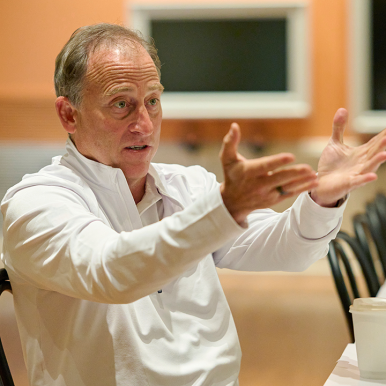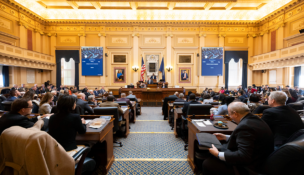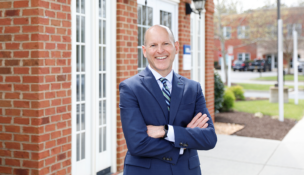Under new management
Commanders get fresh start with owner Josh Harris
Kate Andrews //September 28, 2023//

Billionaire investor Josh Harris, a Maryland native, became the Washington Commanders’ new owner in July. He led a group of investors who acquired the NFL franchise for $6.05 billion, the highest price ever paid for a professional sports team. Photo by Shannon Ayres

Billionaire investor Josh Harris, a Maryland native, became the Washington Commanders’ new owner in July. He led a group of investors who acquired the NFL franchise for $6.05 billion, the highest price ever paid for a professional sports team. Photo by Shannon Ayres
Under new management
Commanders get fresh start with owner Josh Harris
Kate Andrews //September 28, 2023//
Washington Commanders fans did everything but sing “Ding-Dong! The Witch Is Dead” during the team’s Sept. 10 season opening game.
It felt like a new day as the NFL team came away with a win against the Arizona Cardinals. FedEx Field was sold out, and the stands were packed with local fans instead of supporters of the opposing team, an irritating trend over the past decade-plus.
The reason, of course, was the team’s new ownership as of July. The Commanders’ unpopular former owner, Daniel Snyder, offloaded the team for a record-breaking $6.05 billion to a group led by Chevy Chase, Maryland, native Josh Harris, who assembled 20 investors, including NBA Hall of Famer Magic Johnson. The billionaire investor is now the Ashburn-based NFL team’s primary owner — a relief to many beleaguered fans.
The sale came after a long, ignominious history of mediocre-to-worse win-loss records, a revolving door of quarterbacks and coaches, alleged interference and retaliation by Snyder, and — most seriously — two NFL investigations of alleged sexual harassment against female employees and findings of a “toxic work culture” in a U.S. House of Representatives report in 2022.
Last year, amid congressional scrutiny of Snyder’s team, Northern Virginia state legislators rescinded their offer of economic incentives to bring a future Commanders football stadium to the commonwealth. (See related story.) Another team owner said it may be time for Snyder to sell, breaking the traditional code of silence among NFL owners.
And even those problems didn’t touch the sheer magnitude of local distaste for Snyder, who bought the Super Bowl-winning team in 1999 and saw its attendance decline from perennially sold-out games to the lowest numbers in the NFL, as well as a dearth of post-season wins.
Exorbitant parking fees, 9/11 commemorative Redskins baseball caps sold at a profit, Snyder’s lawsuits against 125 fans who tried to back out of season ticket purchases and much more all added to the sense of insult.
It’s no wonder fans at the Sept. 10 game chanted “Thank you!” to majority owner Harris, who co-founded the private equity firm Apollo Global Management and whose net worth is estimated between $6.9 billion and $8.6 billion.
In addition to the Commanders, Harris is principal owner of the Philadelphia 76ers NBA team and the NHL’s New Jersey Devils, as well as a general partner of the Crystal Palace English football club. His home base is in Miami, where he and his wife, Marjorie, live with the two youngest of their five children. They also spend some of the year in New York City.
Last year, Harris’ investment group put in a bid for the Denver Broncos NFL team and lost out to a group led by Walmart heir Rob Walton. But in an interview with Virginia Business on the Friday preceding the start of the 2023 NFL season, Harris says he considers the failed bid a blessing, because he was able to purchase the Commanders, his favorite pro football team while he was growing up.

Virginia Business: When did you first seriously consider buying the Commanders?
Josh Harris: Really, it was a sales process. Dan himself hired a banker and there was a process. We got a call, and that was probably in the fall of last year. Certainly, we’re well known in the sports community, obviously, so generally speaking, the intermediaries, the banks — Bank of America in this case — knew we were out there, contacted our people, and then eventually I spoke with the Snyder family.
VB: It sounds like you have pretty solid ideas of what role you’re meant to take as owner, and where to let coaches and players handle things themselves. How did you learn those lessons?
Harris: Obviously, I’ve owned the Philadelphia 76ers since 2011 and a number of other sports franchises — the [New Jersey] Devils since 2013, Crystal Palace since 2015.
It’s been experiential learning, on-the-job training, if you will, but also, it’s just common sense. But in sports, because fans [are] so focused on all the details and because everyone is such a great fan of the sport, sometimes owners who are fans come in and they want to make a lot of decisions. But it’s like every other career.
Ultimately, the years of learning that a coach might have dealing with 53 men, 53 individuals, and how to make a system work — if [owners] don’t defer to that [experience], that would probably not be common sense. Sometimes people don’t.
VB: With sports, people do have strong emotions and yell at the TV screen to change quarterbacks or strategies. Is that a temptation you have to fight?
Harris: Yes. Listen, I’ll go the other way. Just because I’m only a fan that’s recently become an owner of the Washington Commanders, it doesn’t mean that you’re not entitled to have opinions, it doesn’t mean that you might not see something that a coach might not.
I’ve sat on the floor for the last 11 years for NBA basketball. I have an opinion on how we should play, and I have opinions on some things that I see, but generally, I will voice those in a constructive way at the right time quietly.
You’re allowed to be involved, and you should be involved. If you see something you don’t like and you’re the owner of a franchise, it’s almost on you to bring it up and say, “What about this? What about that?” At the same time, I think you have to recognize that other people might have more experience than you do. It’s finding that balance, and everyone is different.

VB: A congressional report said the Commanders had a “toxic work culture” under Snyder’s leadership. What are your responsibilities for improving and maintaining the team’s culture as its new owner?
Harris: The thing about sports franchises — unlike companies generally — is that they’re public assets; they’re public trusts. I want to create a franchise that my kids are proud of, and the city is proud of and I’m proud of. I think everything, ultimately, is my responsibility. I spend many sleepless nights thinking about making sure that everything is going to go right. I think that extends to how people are treated inside the organization, how employees are treated, how they act with one another, how fans are treated, how all the stakeholders, players and coaches are treated. It’s a village, so what I have to do is set the tone and then hold people accountable.
VB: How did the process of buying the Commanders differ from bidding for the Denver Broncos?
Harris: It was different personally for me. I think I was blessed in some sense to not buy the Broncos.
Obviously, this is where I grew up, and it was emotional for me, and I’ll never forget when I walked into FedEx Field and I saw the pictures. I have an investment team that I’ve been involved with [for] a lot of this stuff. You have a whole team that shows up with you [when] we were given a couple days to do due diligence.
We came into the stadium and my team saw me marveling at the pictures of the legends and Super Bowl trophies, and they were like, “This is different. You’re acting differently.” I’m not an emotional person as an investor. I try to be quite clinical about it, but clearly, I was emotional about it, and that was very different for me personally.
VB: Speaking of stadiums, what do you consider important attributes for a new stadium?
Harris: I start with football and I branch out. When an opposing team walks into our stadium, I want them to not want to be there. When I was talking to [former Dallas Cowboys quarterback] Troy Aikman on “Monday Night Football,” he’s a guy who didn’t like to play [at] RFK. On the other hand, I want our team to feel excited. The noise level, how you set it up, the crowd engagement and focus, all that’s good.
Then you get to fan experience, which is a really broad concept, but accessibility really matters, whether it’s being on … Metro, whether it’s a close drive, ingress and egress parking, all that stuff. We want people to get in, get out, have a great time. The Washington DMV fan base does extend deep into Virginia; it extends into Maryland.
Not everyone is going to have the same accessibility, but certainly having it on a rail system would be a massive plus. Having it close to most of the fans, [being] able to get in and out [of] major highway systems, all that actually really matters, all those logistics.
Then it’s about economic development, and how you help a community economically. I mean, we built a practice facility [for the 76ers] in Camden, [New Jersey], which is a tough city. We run Prudential Center in Newark. We’re building a center in Philly in an area that needs help, and … we’re using trade. If we are allowed to go forward in Philly [with a new arena], we’re going to use contractors from diverse backgrounds, which is probably slightly different than what’s happened in the past.
All that stuff plays into it.

VB: Under the team’s previous ownership, two possible stadium locations were designated in Loudoun and Prince William counties. What’s the status on those?
Harris: We’re literally just starting at the beginning. We’re at the very beginning of thinking about what we want, versus the sites.
VB: You grew up in the area. What was your relationship to the team?
Harris: My relationship with the team was really deep. There’s a picture of me that someone dredged up wearing a [1970s Washington quarterback] Billy Kilmer uniform when I was like 10 years old. I was a huge fan, and I never in my wildest dreams thought I might own the Commanders. I went to RFK once or twice a season. It was a 25-year waiting list to get [season] tickets.
I have two really early memories as a child. One is walking down East Capitol Street and then walking into RFK and hearing … all the noise and looking up at Jack Kent Cooke’s owner’s box, and my dad saying, “That’s the owner,” and me saying, “Wow.”
VB: The team’s name has changed twice in the last few years. What’s your timeline for thinking about the name?
Harris: We’re really focused right now, honestly, on limiting distraction. We’re focused on getting the stadium ready, and I’m doing tons of meetings everywhere in the city to engage with everyone. I’m not really thinking about [the name] right now.
VB: You have 20 people in your investment group, including Magic Johnson. What do they bring to the table?
Harris: Look, the reality of an NFL franchise is that it’s expensive, and so it’s hard to participate unless you’ve had tremendous success. We have people that have D.C. backgrounds that are super-engaged charitably in the community. We have a lot of diversity in the group. Then we have amazing business builders, real estate people. Honestly, Eric Schmidt is in our group. Can you imagine I [brought in] one of the founders of Google? Obviously, Mitch [Rales] built Danaher, a storied business. When I left Apollo and I was considering what to do, I was trying to find people that I could talk to, and I sought out Mitch because I said, “Wow, this guy built Danaher, [a] $200 billion company,” and by the way, D.C.’s biggest company. As far as professional athletes, [there’s] Magic Johnson.
VB: Is Magic on your text chain? What’s he like?
Harris: Yes. Magic, I would say, he’s incredibly charismatic, an amazing motivator. I’m motivated when I speak to him. He’s won five NBA titles with the Lakers, and then five other titles with other sports, and he’s built an incredible business. He’s an amazing speaker. He can relate to a businessman, and then he can relate to the players, and he can relate to a 10-year-old at a boys’ club.
He has an amazing way of connecting with people, and he’s a humble person. I think for him to be humble, he’s a great example for me because he’s achieved so much in his life and he’s someone that I want to emulate. … By the way, the other thing I like about Magic, and we share this, is that he’s a religious person. He believes that there’s a greater force. For all of us who’ve achieved some luck and been blessed in our life, I think personally it really helps me, and it’s something I really relate to.
VB: Let’s look ahead five years. What will need to be in place for you to consider this purchase a success?

Harris: I think that we’re going to need to have improved the fan experience to a great extent. That would mean improving the existing FedEx Field and [making] substantial progress towards a new stadium. In five years, I would hope that we would be a perennial playoff team. I’d say in five years I would want to see the arena selling out on a consistent basis and the team being supported, and I want us to be more deeply engaged in the community.
VB: The Sixers had a big rebuilding period under your ownership. Do you think the Commanders could benefit from a similar rebuilding that was high-risk, high-reward?
Harris: I think they’re totally different. Obviously, when you engage in a rebuild as we did in Philly, we wanted to be a championship-contending team. We rebuilt the team, and it worked. We haven’t won an NBA championship, obviously, but we’re perennial contenders every year right now.
I think the Commanders’ situation is totally different than that. Look, I think that we have a great young team. We don’t have an aged team. I’d say that so far I really like what I see in the coaching staff. I think [Head Coach] Ron [Rivera] is a good man. We have real areas of strength on the team. I think the answers to what we do and what we think will become apparent as this season plays out.
VB: I saw a picture recently of you and Virginia Gov. Glenn Youngkin at the Commanders’ Ashburn facility. He was previously co-CEO of the Carlyle Group, so how long have you known each other?
Harris: I’ve known him for many years. We were in the same business. We competed, but … I always had great respect for Glenn. He was always just a really nice person and a decent human being. Even though we were competitors, we were kind of friendly competitors.
VB: Does that have any bearing on where you would decide to put the stadium?
Harris: Look, I have to actually think about the city. Having a relationship of trust always matters in every situation, but, obviously, we’re going to do what’s right for the DMV. There is a “V” in DMV.
RELATED STORY: Virginia’s back in game to score Commanders stadium


















